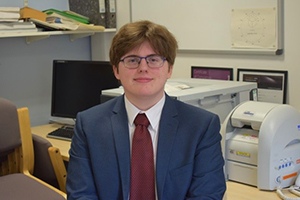My apprenticeship journey in Clinical Engineering by Joshua Craggs Hill
Find out about Joshua's apprenticeship journey and his experiences so far.
- Programme
- Apprenticeships
- Role
- Apprentice
I am 20 years old and live in Boston Spa a small town near Leeds; I finished my A-Levels in 2018 having studied Biology, Chemistry and Maths. I have an interest in computing and have built and repaired several computers.
I found out about this apprenticeship at the Leeds Apprenticeship fair, where there was a stand set up by the NHS offering several types of apprenticeships. I spoke to one of the older medical engineering apprentices who was very informative about the course.
The application process was extensive. Firstly the application on NHS Jobs was comprehensive, asking for qualifications, employment history, referees and supporting information. I was successful at being shortlisted and was invited to an assessment day that was held at St James hospital in Leeds. During this day I completed a short electronics test, a short electronics practical, a teamwork with the other applicants, a maths test, a English test and a ICT test. Once again I was shortlisted and asked to attend an interview with the apprentice manager, two team leaders and a representative from the training provider, Avensys. The interview lasted for almost an hour. During the interview they asked about my interests, school career and some other personal questions. I was called the same evening and asked to return in a few days where I was offered a position as a Healthcare Science Clinical Engineering level 4 apprentices. I was given a tour of some of the medical engineering workshops and shown some examples of the equipment I would be working on and the areas that I would be working in over the next 2 years.
After I was offered a post I attended weekly meetings via MS Teams where I, and the other successful candidates, were informed about some of the things happening in the hospital and reviewed how we were getting on with employment progress. The pre-employment checks were just as extensive as the application process, requiring vaccination records, qualification records, proof of identification and address and obtaining suitable professional referees
I had considered IT and several types of engineering apprenticeships before seeing this medical engineering apprenticeship. After I was made aware of this opportunity however I knew that this is what I wanted to do. I was not aware of the profession until I saw it at Leeds Apprenticeship fair.
It was daunting going into my first placement as I have never worked in this type of environment before. But after a few days of getting to know some of the engineers I shadowed I felt much more comfortable. They were very supportive and allowed me to do a lot of hands on repairs.
Medical physics is essential to the running of a hospital as we manage medical devices from design and manufacture, to implementing and commissioning them ready for use in a clinical area, repairing and servicing equipment regularly and finally decommissioning and disposing of devices that have come to end of life. This is obviously incredibly important as there are thousands of medical devices in operation in a hospital, from blood pressure monitors all the way up to Linear Accelerators; all capable of helping diagnose and treat patients but also if not managed, serviced and maintained are capable of misdiagnosing
Working as a Medical Engineer is incredibly rewarding as the devices that you work with are used to save lives every day, when walking through the hospital you can see the devices you work on being used to help better someone’s life.
Apprentice profile
Name: Joshua Craggs Hill
Age: 20 years
Apprenticeship: 1st year Level 4 Healthcare Science Diploma Apprentice
Employer: Leeds Teaching Hospitals NHS Trust
Training Provider: Dudley College / Avensys Medical
